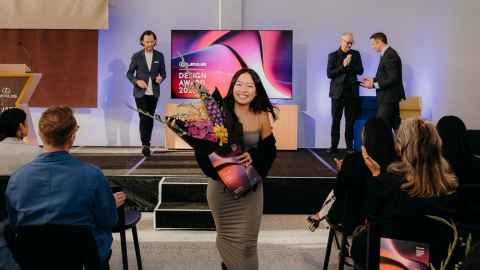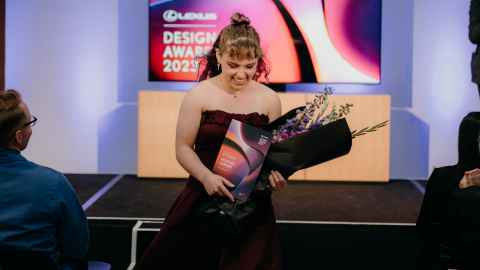Double impact: awards celebrate empathetic design solutions
16 November 2023
Two standout prototypes from Design students in the Faculty of Creative Arts and Industries blend cutting-edge technology with a compassionate and empathetic approach.

An exercise therapy programme that uses artificial intelligence and augmented reality to help seniors combat depression has won a first-place prize at the New Zealand Lexus Design Awards.
The awards are an annual showcase of the top student designers at the University of Auckland and AUT, with dual awards for each institute. This year’s competition theme was ‘Design for a Better Tomorrow’.
Fiona Yoon, a final year Bachelor of Design student in the Faculty of Creative Arts and Industries, took home the University’s $4,000 prize for her entry ARctive, which was completed as her capstone project in partnership with Auckland Bioengineering Institute’s Empathic Computing Laboratory.
The ARctive prototype Fiona designed includes an augmented reality headset and remote which are used to complete several physical exercises that gradually increase in difficulty. Beyond the physical aspects, the programme encourages users to express their emotions, recognise their feelings and offers practical advice on the steps they can take to foster holistic well-being.
“A void existed in the current market for a tool that comprehensively tackles depression, considering the technological constraints of older individuals and prioritising health values like physical well-being that are often neglected. This approach subtly addresses depression, reducing stigma and providing a user-friendly avenue for elders who might be hesitant to seek help,” says Fiona.
“The ultimate goal is for ARctive to serve as an innovative and engaging tool, empowering lonely, depressed, or fatigued elders to enhance their well-being and find greater happiness.”

Mackenzie Carkeek, a first year Bachelor of Design student, was named as the University’s second-place winner at the awards and won $2,000 for her device The Haptic Patch, developed as the outcome of the elective course, The Future of Work and Play. It utilises haptic technology and virtual reality to alleviate the complex physical and emotional distress faced by amputees dealing with phantom limb sensations.
Haptic technology replicates the sense of touch through vibrations, feedback or motion. The device designed by Mackenzie works by utilising pulses of haptic feedback to restore the feeling of a lost limb, in the hopes of providing emotional healing and a renewed sense of self.
“The goal is not just to restore the body but also the soul. The project empowers individuals who have experienced limb loss, granting them peace of mind and relieving pain. By bridging the gap between physical therapy and emotional recovery, the project redefines the boundaries of design, technology and human compassion,” says Mackenzie.
Media contact
Hussein Moses | Media adviser
M: 027 361 1000
E: hussein.moses@auckland.ac.nz